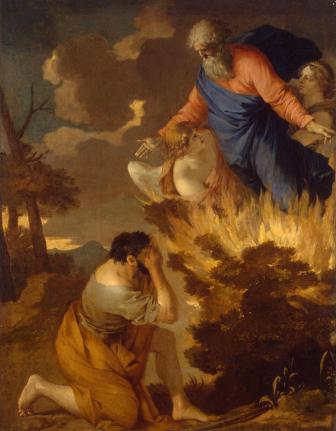“Pardon your servant, Lord. I have never been eloquent, neither in the past nor since you have spoken to your servant. I am slow of speech and tongue.” Exodus 4:10
The question of vocation seems to be a crisis at two major points in life: 1) When a person graduates from high school and enters college. They must declare a major as early as possible, so they can acquire the skills and knowledge needed for their future job. 2) This is often in midlife, when a person finds their job meaningless, unfulfilling and frustrating. They may ask: “Have I wasted my life?” or “Am I stuck in this job forever?”
Redefining the Word Vocation

Burning Bush, Sebastian Bourdon
The word vocation comes from the Latin word meaning “calling.” In our society, the word has lost its true meaning, and has become synonymous with “job.” When thinking of our future vocation, we should consider it in its original sense: a task, responsibility, or even a job that God has called us to. The question for the Christian is more than, “What do I want to do when I grow up?” When pursuing a vocation, we should ask, “Am I doing with my life what God wants me to do?”
God is the Perfect Guidance Counselor
Assessing our skills, knowledge and passion is a basic part of the decision-making process in choosing a vocation. But we shouldn’t do that alone, or we might miss out on God’s amazing plan for our lives. God has already assessed our skills. God is perfect in His selection, and calls people according to the gifts and talents that He has given them.
Consider Moses, the most important figure in the Old Testament. Becoming God’s lawgiver, prophet, miracle worker and leader could not have been further from his mind.
Read the account of Moses and the burning bush (Exodus 4:1-18)
Moses: A Poor Public Speaker, an Effective Leader
When God revealed to Moses his vocation, Moses resisted it by saying that he lacked the skills for the job. Moses appealed to God that he was a poor public speaker. God rebuked him for trying to evade God’s calling by claiming that he lacked the ability to do the job.
Yet Moses did not understand what skills were needed to live out the vocation God gave him. Moses was not a great speaker, but God had prepared Aaron to help Moses with that part of the task. God was not looking for a polished speaker, because the vocation required obedient leadership from Moses. God had already assessed Moses’ gifts and abilities before calling him.
Pursuing our Vocation, Not Looking for a Job
A vocation is something that we receive from God; He may not give us a specific set of orders like he did Moses. He may not give us a vocation to which we feel well suited. But God always calls us by giving us certain gifts, talents, and aspirations that we need. Jesus promises us that the Holy Spirit will guide us into all truth (John 16:13), which includes the area of our work. The discernment of our vocation comes through unhurried prayer, dwelling in God’s Word, and seeking godly counsel.


Pingback: Moses, the Burning Bush, and Choosing a Major « HUNTINGTOWN UNITED METHODIST CHURCH